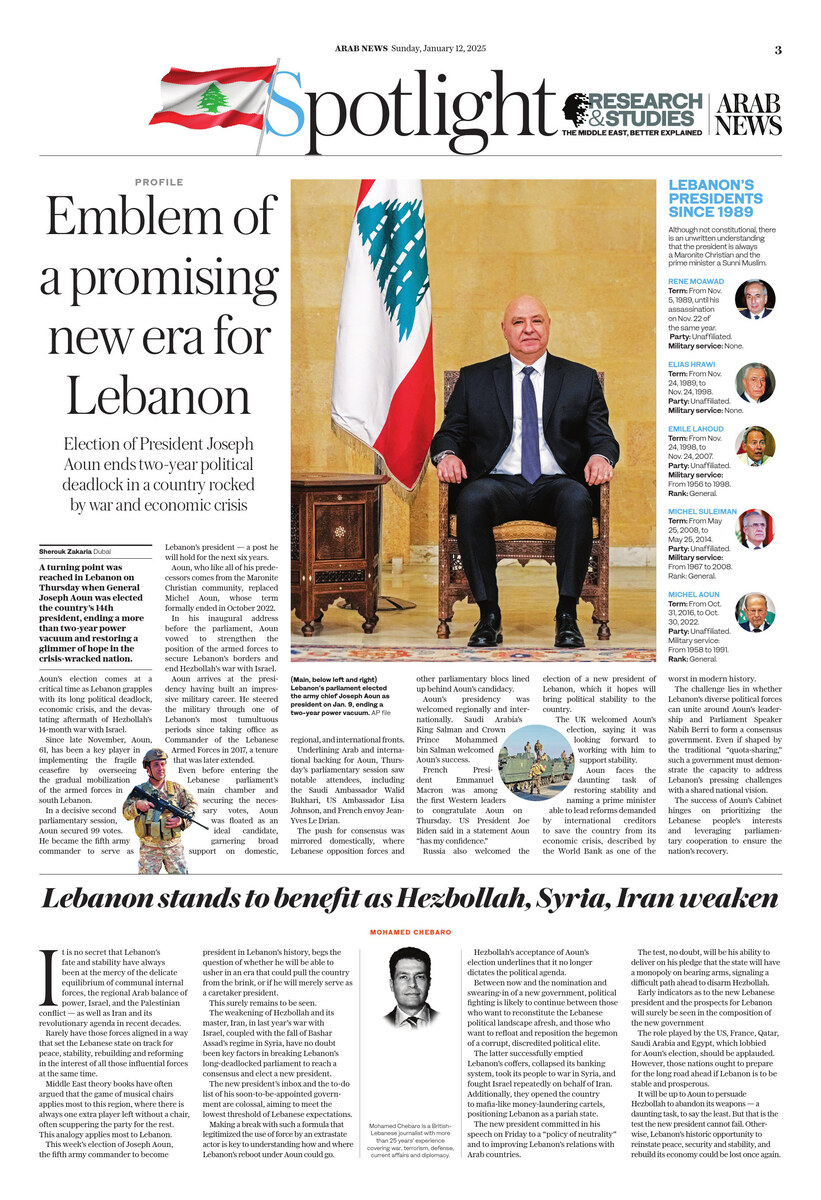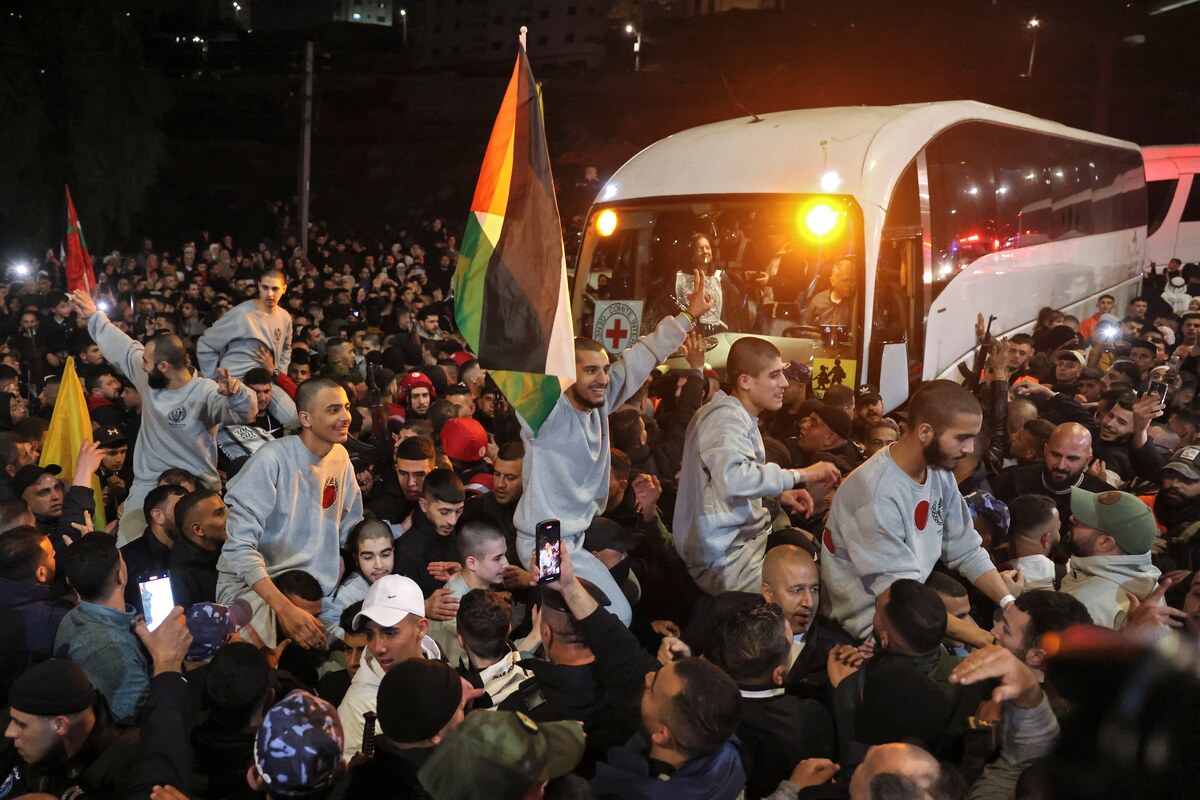DUBAI: A turning point was reached in Lebanon on Thursday when General Joseph Aoun was elected the country’s 14th president, ending a more than two-year power vacuum and restoring a glimmer of hope in the crisis-wracked nation.
Aoun’s election comes at a critical time as Lebanon grapples with its long political deadlock, economic crisis, and the devastating aftermath of Hezbollah’s 14-month war with Israel, which left vast areas of Lebanon in ruins and killed more than 4,000.
Since late November, Aoun, 61, has been a key player as the army commander in implementing the fragile ceasefire by overseeing the gradual mobilization of the armed forces in south Lebanon.
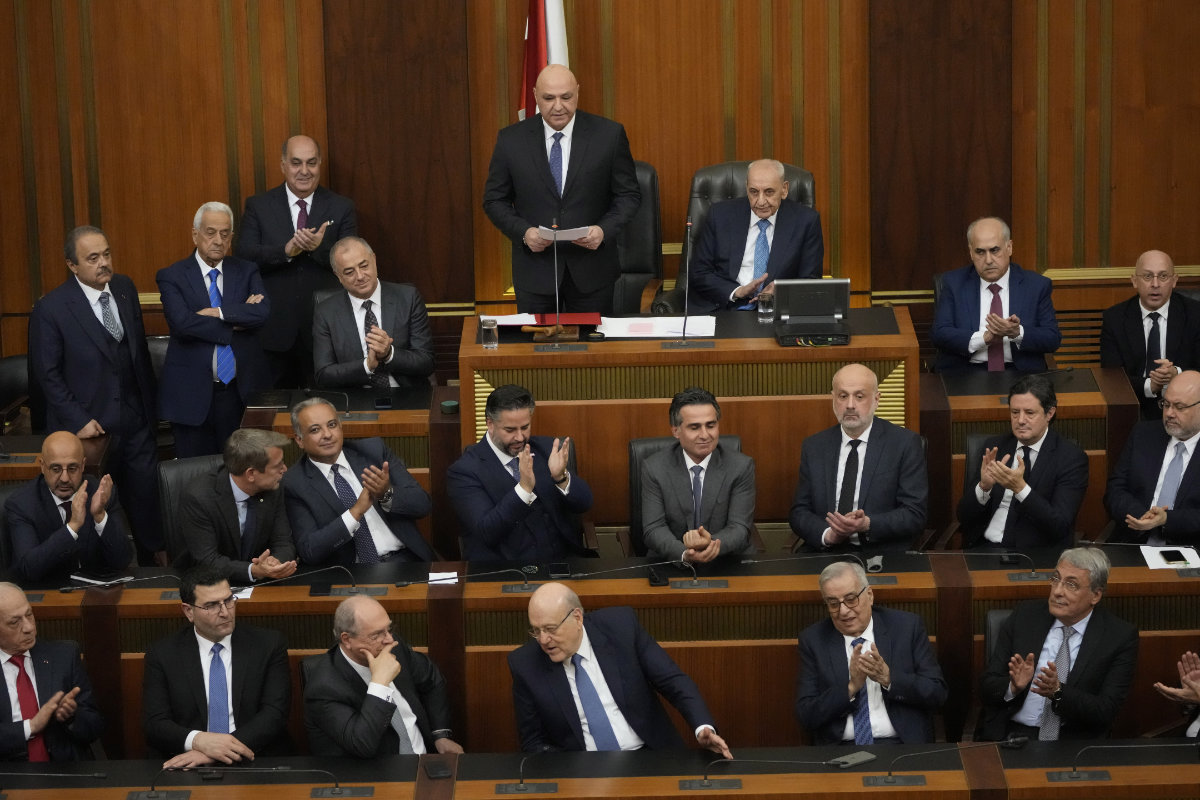
Lebanese cabinet ministers applaud newly elected Lebanese President Joseph Aoun, standing at the top, as gives his first speech at Parliament after being sworn in as president in Beirut on Jan. 9, 2025. (AP)
Under the terms of the truce, the Lebanese Army has been gradually deployed alongside UN peacekeepers in the south as Israeli forces withdraw — a process they must complete by January 26.
Widely backed by western and regional powers, Joseph Aoun is perceived as best to maintain the fragile ceasefire and strengthen Lebanon's international relations, crucial for rallying the support needed to revive the country’s depleted finances.
In a decisive second parliamentary session, Aoun gained 99 votes — enough to secure him the presidency. He became the fifth army commander to serve as Lebanon’s president — a post he will hold for the next six years.
His election reflects a critical compromise among Lebanon’s political blocs, which made notable concessions to ensure a resolution to the deadlock, after a failed first session brought Aoun 71 votes.

Mourners carry portraits of Hezbollah fighters killed in fighting with Israel, at their funeral procession in the southern Lebanese village of Majdal Selm on December 6, 2024. The Hezbollah had been considered an obstacle to peace and stability in Lebanon. (AFP)
Over the past 26 months, 12 previous attempts to choose a president failed amid tensions between Hezbollah and its allies on one side and opposition parties on the other, which accused the Iran-backed Shiite militia of seeking to impose its preferred candidate.
Aoun, who like all of his predecessors comes from the Maronite Christian community, as required by Lebanon’s National Pact, replaced Michel Aoun, whose term formally ended in October 2022.
In his inaugural address before the parliament, Aoun vowed to strengthen the position of the armed forces to secure Lebanon’s borders, particularly in the south, fight terrorism, and end Hezbollah’s war with Israel.
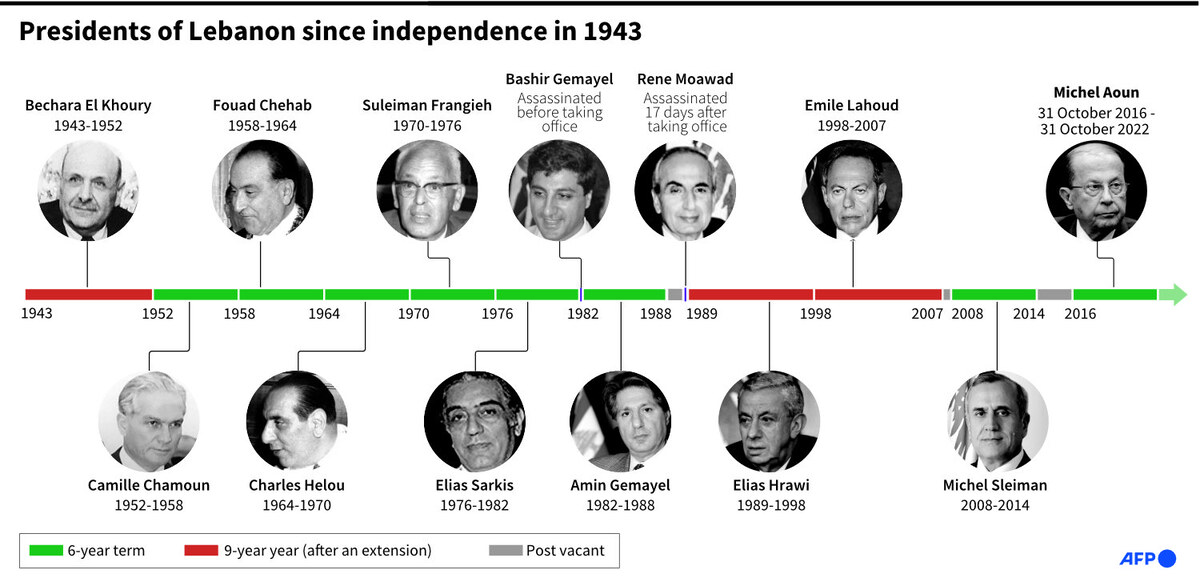
Like all of his predecessors, Lebanon's new president, Joseph Aoun, comes from the Maronite Christian community, as required by Lebanon’s National Pact. (AFP infographic)
He also pledged to lead postwar reconstruction efforts, reaffirming Lebanon’s unity.
Aoun arrives at the presidency having built an impressive military career. He steered the military through one of Lebanon’s most tumultuous periods since taking office as Commander of the Lebanese Armed Forces in 2017, a tenure that was later extended.
Fluent in Arabic, French, and English, Aoun began his military career in 1983 when he volunteered for the army as an officer cadet before enrolling in the Military College.
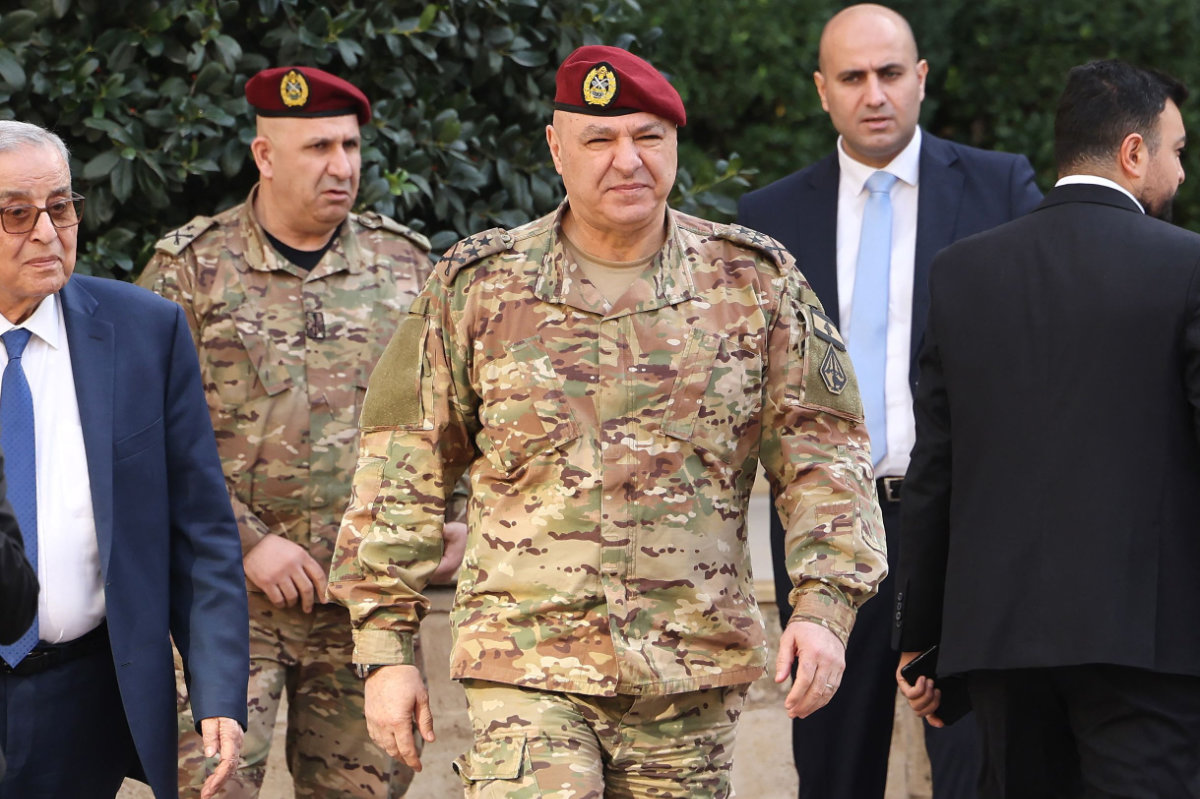
By shielding Lebanon's army from political conflicts, including Hezbollah’s war with Israel, Aoun ensured its role as a unifying force in a deeply divided country. (AFP)
His leadership was lauded during the army’s “Dawn of the Outskirts” operation that successfully expelled Syrian militants affiliated with Daesh and Jabhat Al-Nusra in Arsal from Lebanon’s borders.
By shielding the army from political conflicts, including Hezbollah’s war with Israel, Aoun maintained his forces’ neutrality and ensured its role as a unifying force in a country of political and sectarian divides.
Additionally, he has worked to rid the military of corruption and has collaborated with other states to secure aid for army personnel after their monthly salaries dropped to less than $50.

People lift national flags as they offer sweets to passing cars in Beirut's southern village of Qlayaa on January 9, 2025, to celebrate the election of Gen. Joseph Aoun as president of Lebanon. (AFP)
Even before entering the Lebanese parliament’s main chamber and securing the necessary votes, Aoun was floated as an ideal candidate, garnering broad support on domestic, regional, and international fronts.
Washington is the main financial backer of the Lebanese Army, which also receives support from other countries including Qatar.
Opinion
This section contains relevant reference points, placed in (Opinion field)
Underlining Arab and international backing for Aoun, Thursday’s parliamentary session saw notable attendees, including the Saudi Ambassador Walid Bukhari, US Ambassador Lisa Johnson, and French envoy Jean-Yves Le Drian.
The push for consensus, marked by successive high-level visits to Lebanon by Saudi, Qatari, French, and US officials before the election, was mirrored domestically, where Lebanese opposition forces and other parliamentary blocs lined up behind Aoun’s candidacy
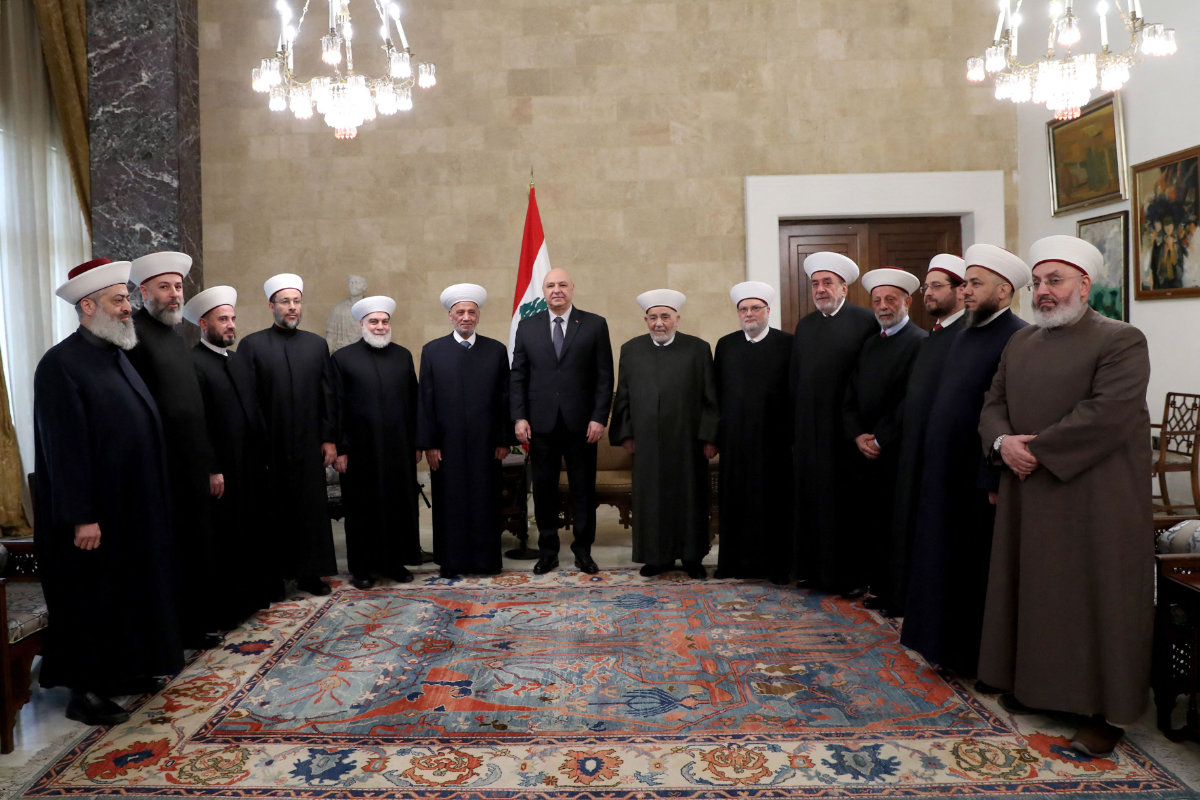
Lebanon's new President Joseph Aoun (C-R) receiving a delegation of Lebanese Sunni Muslim religious figures headed by Sheikh Abdul Latif Derian (C-L) at the presidential palace in Baabda, east of Beirut on January 11, 2025. (Photo by Lebanese Presidency / AFP)
Lebanon’s Forces of Change was among the factions that supported Aoun, praising his record of restoring order when thousands of Lebanese protesters took to the streets following the country’s economic collapse in 2019.
Notably, the Shiite duo — Hezbollah and the Amal Movement — backed his candidacy, solidifying the support needed to elect Aoun in the second round of voting.
However, the Free Patriotic Movement and other independent MPs opposed Aoun’s nomination, arguing that his election was the result of international and regional dictates over a sovereign Lebanese decision.
Aoun’s presidency was welcomed regionally and internationally.
READ MORE:
• Many reasons for optimism about Syria and Lebanon
• A new era and a golden opportunity for Lebanon
• Uniting the Lebanese is Aoun’s most important mission
Saudi Arabia’s King Salman and Crown Prince Mohammed bin Salman welcomed Aoun’s success, wishing the Lebanese people further progress and prosperity.
Qatar likewise praised Aoun’s election, calling for “stability,” while Gulf Cooperation Council Secretary-General Jasem Al-Budaiwi wished him luck in achieving prosperity for Lebanon and stronger ties with the Gulf bloc.
Al-Budaiwi reiterated the GCC’s support for Lebanon’s sovereignty, security, and stability, as well as its armed forces.
The leaders of Jordan and the UAE pledged to work with the new president to boost ties and support reforms, while Palestinian Authority President Mahmoud Abbas said Lebanon would overcome the “repercussions of Israeli aggression” under the new leadership.
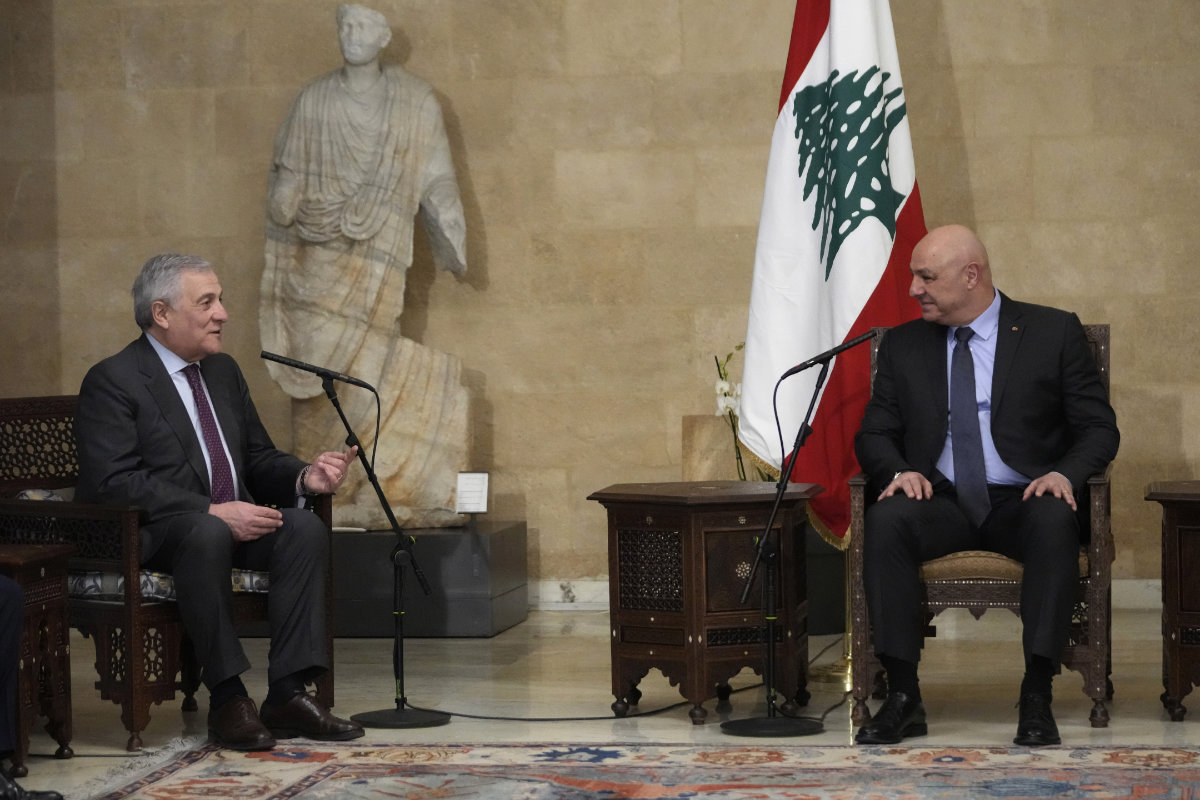
Lebanese President Joseph Aoun, right, meets with Italian Foreign Minister Antonio Tajani at the presidential palace in Baabda, east of Beirut, on Jan. 10, 2025. (AP)
French President Emmanuel Macron was among the first Western leaders to congratulate Aoun on Thursday.
“(The election) paves the way for reform and the restoration of Lebanon’s sovereignty and prosperity,” Macron posted on X. In a phone call with Aoun later, he said France “will continue to be at the side of Lebanon and its people,” vowing to visit the country soon.
In a statement, US President Joe Biden said Aoun “has my confidence. I strongly believe he is the right leader for this time.”
UN Secretary-General Antonio Guterres called for the swift formation of a new government, to preserve the country’s security and stability, strengthen state authority, and advance much-needed reforms.
The UN Security Council also congratulated Aoun and affirmed “strong support for the territorial integrity, sovereignty, and political independence of Lebanon,” while calling for a full implementation of Resolution 1701.
UNSC members also emphasized the importance of the election in ensuring fully functional state institutions to address the “pressing economic political and security challenges” of the country.
European Commission President Ursula von der Leyen described the election of Aoun as a “moment of hope” for the country. “The way is now open to stability and reforms. Europe supports this path,” she posted on X.
Germany’s Foreign Minister Annalena Baerbock said Lebanon’s new president was a chance for “reforms and change.”
“After many years of crisis and stagnation, this is a moment of opportunity to bring about reforms and change,” Baerbock posted on X. “Germany stands by the side of the people of Lebanon on the way forward.”
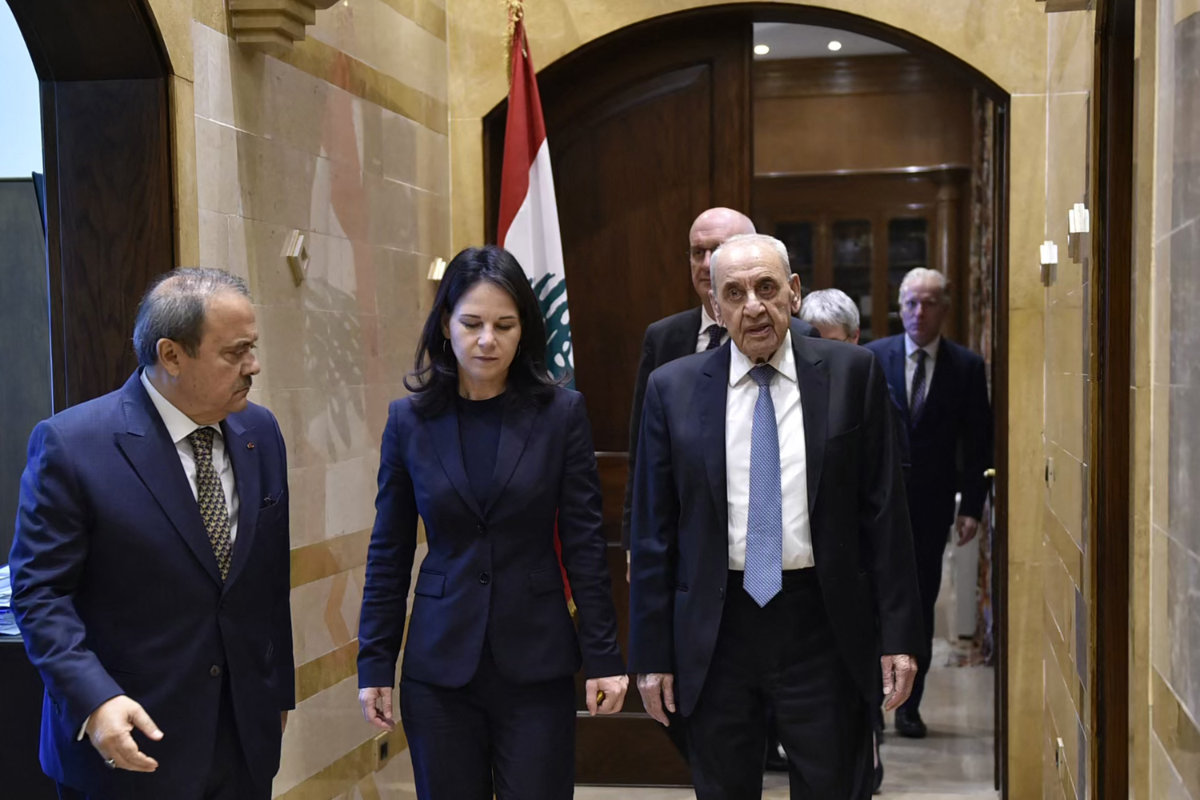
Lebanon's Parliament Speaker Nabih Berri (R) receives Germany's Foreign Minister Annalena Baerbock (C) at his office in Beirut on October 23, 2024. (AFP)
Russia also welcomed the election of a new president of Lebanon, which it hopes will bring political stability to the country.
Aoun’s election “opened up the prospect of strengthening internal political stability in Lebanon and righting the country’s complex social and economic position,” the foreign ministry said in a statement.
The UK welcomed Aoun’s election, saying it was looking forward to working with him to support stability.
“I congratulate General Joseph Aoun on his election as president of Lebanon,” Foreign Secretary David Lammy wrote on X. “I look forward to working with his government to support Lebanon’s stability and prosperity.”
Aoun faces the daunting task of restoring stability and naming a prime minister able to lead reforms demanded by international creditors to save the country from its economic crisis, described by the World Bank as one of the worst in modern history.
The challenge lies in whether Lebanon’s diverse political forces can unite around Aoun’s leadership and Parliament Speaker Nabih Berri to form a consensus government.
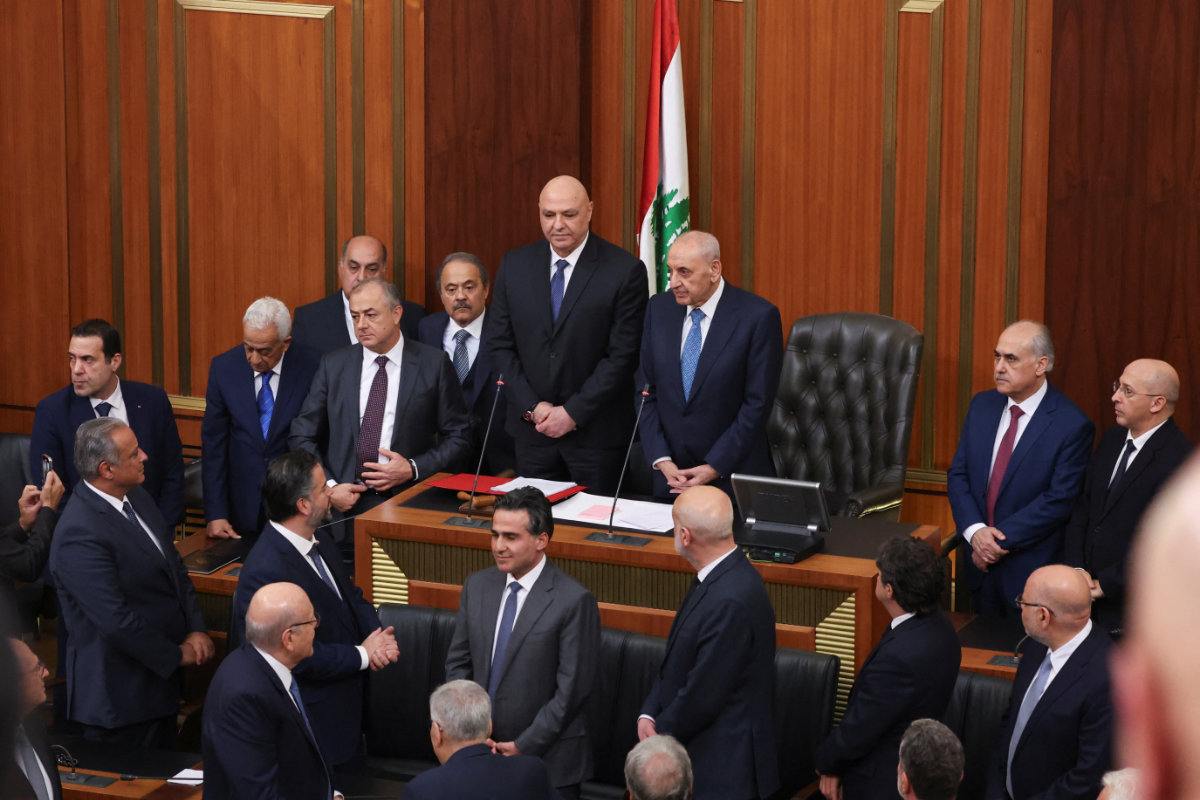
Lebanese Parliament leaders led by Speaker Nabih Berri acknowledge army chief Joseph Aoun's election as the country's president at the parliament building in Beirut on January 9, 2025. (Reuters)
Even if shaped by the traditional “quota-sharing,” such a government must demonstrate the capacity to address Lebanon’s pressing challenges with a comprehensive and shared national vision.
The success of Aoun’s cabinet hinges on prioritizing the Lebanese people’s interests and leveraging parliamentary cooperation to ensure the nation’s recovery, navigating the nation out of the turmoil that has long overshadowed its potential.
